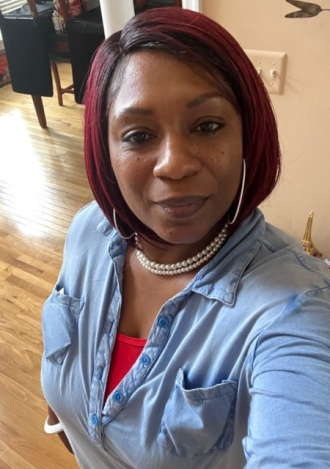
(Posted 2022 September)
Meet Teri Douglas, ADAPT Volunteer

How long have you been volunteering? How long have you held this role in Fairfax County?
Volunteering has been a staple of my life for a long time, but I started volunteering with Fairfax County during COVID in 2020. It was a part of my leadership development program to inspire the whole soldier concept in the non-commissioned officers on my team, and I lead by example.
Why volunteer? Why volunteer for this specific program?
Volunteering increases your sphere of influence. Doing something for your loved ones or close friends and acquaintances is par for the course. But stepping outside of that bubble and giving to someone else opens you up to growing and developing. It contributes to good values and enhances your moral fiber.
I volunteered for ADAPT because it was not my norm. I am a trained victim advocate and with the exception of supervising soldiers who had been accused of assault, it had never been my specific goal to help someone in that position learn to regulate the emotions that possibly caused them to act in a way that violated the Army values and the law. It was time to expand my psyche to include everyone. I was ready to step out of my comfort zone and redefine my definition of victim and survivor. The successful participants of the ADAPT program are survivors of venomous cultural norms, toxic masculinity, previous abuse, and harmful parenting. They are not their events. I appreciate this program because it has internalized that for me.
Talk about how you overcome the most challenging parts of volunteering.
Volunteering is about time management. It is mandatory to appear at your job at the assigned time and appointed place if you want to continue to receive a paycheck. Volunteering, on the other hand, means juggling your "free" time. For me, that is hard. I seem to always have so much going on that my balls drop. Keeping everything going is a continuous challenge.
What’s the best part about volunteering? Share your most memorable experience.
Empowering yourself to make a difference is the best part of volunteering. We are often very focused on helping others and sometimes forget to intentionally help ourselves become better. Volunteering is a focused effort on improving your mental health, self-sacrifice, and personal development.
My most memorable moment as a volunteer actually happened about 18 years ago when I was in Germany volunteering as a youth cheerleading coach. Children are resilient and mostly take things. Often, parents will give them a push to help them. Watching those children go from shy scared strangers to strong cohesive teams has been one of the highlights of volunteering. Sometimes it is hard to see your difference. That year it was not. Many of them contacted me later (through my daughter's social media) to tell me the cheerleading lessons I gave them on confidence and being a good team member were still codes they lived by.
What has been your favorite type of training? What did you like about it? What did you learn?
My most influential training was "Trauma Informed Questioning" by Russell Strand. That training has stayed with me for over a decade. It really opened my eyes and remapped truth verses facts when it comes to how survivors relay the timeline and details of a traumatic event. We have been programmed to believe that if something happened and you are telling the truth, you will have no problem retelling the events in the exact chronological order with proper details when asked. That is not true for traumatic events. Survivors often remember details out of order, or some things are blanked from their memory all together. When tending to a survivor of abuse, your empathy must be at its highest. Your ability to put aside your biases and social norms has to be paramount if you want to provide the best possible care.
What advice do you have for people who may be thinking about becoming a DSVS volunteer?
Do it! You can’t ask for a better support team than that of the DSVS staff.
What do you wish you could do more of as a volunteer?
That is a hard one. I have been pretty fulfilled giving my time to DSVS. It offers you both sides of an incident to make an impact, and Fairfax County has a whole board with everything from picking up trash to water purification opportunities that you can partake in on weekdays and weekends.
This article posting is part of the Domestic and Sexual Violence Services' Volunteer Voices monthly newsletter for current and potential volunteers. If you're not already a volunteer, learn how to get involved. Find out about upcoming trainings, volunteer trainings, happenings around the DSVS office and information about articles, books, media recommendations and more.
Learn more about the Domestic and Sexual Violence Services (DSVS).

